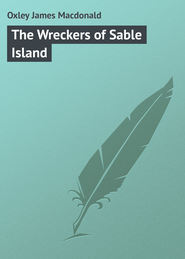По всем вопросам обращайтесь на: info@litportal.ru
(©) 2003-2024.
✖
Donalblane of Darien
Настройки чтения
Размер шрифта
Высота строк
Поля
"Ay, that I would, sir," was the hearty reply; and then, in a sly, apologetic tone, "But of course I'd like to come back again."
Mr. Blane smiled grimly. He quite understood the boy's eagerness to be rid of the restraints of school and of town life, and did not take at all amiss the readiness he expressed to leave the roof that had sheltered him so comfortably, and fare forth into unknown difficulties and dangers.
"And what wad ye say to going with Mr. Paterson away out to America, if he'll let you?" was the next question; and Donald could feel his uncle's deep-set eyes piercing him like arrows.
But he controlled himself wonderfully, and in a quiet, steady voice, that touched no chord of opposition, said, "I wad like it verra weel, if you will let me go, sir."
Mr. Blane was better pleased by this response than he showed, and, after a brief silence, he got up, saying, "Well, well, we'll think about it – we'll think about it. Ye're owre young, maybe, to be leavin' your friends to gang among strangers; but ye're a likely lad, and it may go towards making a man of you. Say naething about it – do you hear? – for the present – not a word."
Donald promptly promised, and left his uncle with a heart full of hope. Only to the dominie did he mention the interview, and then for nearly a week he was kept on tenterhooks of anxiety.
In the meantime Mr. Blane conferred with Mr. Paterson, and having been assured by him that he would take a kindly interest in the boy, and allow him to return at the end of the year if he wished, he fully decided to let him go.
When this was communicated to Donald, he had great difficulty in restraining the impulse to give a great shout and fling his tam-o'-shanter to the ceiling, but by an heroic effort he kept himself in hand, and, after expressing his gratitude to his uncle, hurried away to the dominie with the good news. Thus was this momentous matter settled, and now came the business of getting ready.
Owing to the withdrawal of the English subscribers and the consequent decrease in the amount of capital aimed at, the expedition could not be fitted out on so large a scale as Mr. Paterson had at first intended. Nor was this the only difficulty he had to encounter. If the funds were somewhat deficient, there was no lack of enthusiasm. The chivalry of Scotland had been aroused, and hundreds of men of high family were ready to exchange their prospects in their own country for the golden hopes held out by America, recking little of doubts and dangers.
It became a delicate and troublesome task to select from such a throng of eager volunteers, for, of course, all could not go, and, alas! for the success of the enterprise, in too many cases family interest or personal influence prevailed to find a place for some good-for-nothing scapegrace instead of an honest, hard-working man, who would have been a valuable addition. If only Mr. Paterson had been able to inspire those associated with him with his own unselfish zeal and high integrity, there might have been a different story to tell. Unhappily, he stood almost alone in seeking no advantage or profit. Everybody else had a keen eye to number one. As a natural consequence, numberless jealousies, suspicions, and antagonisms arose. Instead of working harmoniously together, the council in charge of affairs plotted and counterplotted, wrangled and fought, until poor Paterson's patience was utterly exhausted, and he had good reason to wish himself well out of the business.
Not only were the members of the expedition ill-selected, for the reasons given, but the ships that were to carry them, the arms, provisions, goods, and entire equipment, were all contracted for in a manner that greatly enriched the merchants at the expense of the enterprise, and led to the loss of many a life in the after-days.
The ships were old and rotten, but so painted and fixed up as to disguise the fact. The arms were of inferior quality, the provisions adulterated so shamefully as to be hardly fit for human food, and the merchandise taken for traffic with the natives of the Land of Promise consisted mainly of shop-worn remainders; yet for everything the highest price was charged and paid.
To crown all, the ships were commanded by coarse, brutal, and ignorant captains, jealous of and hostile to one another, and caring little for the authority of the council. But Donalblane knew nothing of this, and, beyond warning him to be very careful to keep his own counsel and to be chary of making new friends, his uncle had not given him any hint of it.
Proud of his substantial wooden chest, containing not only an excellent outfit of clothes, but a good pair of pistols, a sword, and a small quantity of beads and trinkets wherewith to do a little trafficking with the natives on his own account, he stood on the deck of the largest of the little fleet of five vessels one bright day in July 1698.
CHAPTER III
OFF TO DARIEN
Five ships, not one of them really fit for the long and perilous voyage, composed the expedition, and they looked gay enough as, bedecked with flags and crowded with excited people, they swung at their moorings ready for departure.
The heart of Scotland beat high with hope. It was her first attempt at founding a colony, although her sons had done so much to help in the founding of English colonies, and now all the glory and the gold to be won in the new world would be hers, and hers alone: no other nation should have any share in them.
Donalblane felt something of this patriotic enthusiasm stirring his young heart. He was not wholly selfish in his desire to be a member of the expedition. Of course, his head was full of wild dreams of what wonders he would see, and the great things he would do in his own interest. But above it all rose a national pride that did him credit. He was a Scot to the backbone; and whether he realised all his own expectations or not he was passionately eager that the great scheme itself should be accomplished, and that his country should take a proud place among the nations.
His uncle, having bidden him good-bye and God-speed, had returned to the quay, and Donalblane, leaning over the bulwarks, was waiting somewhat impatiently for the anchor to be hoisted and the sails set, when a hand was laid gently on his shoulder, and a deep voice said in a kindly tone, "Beginning to feel a little homesick already, lad?"
Looking up quickly, Donald found beside him the master-spirit of the enterprise, William Paterson, to whom he had been once introduced in his uncle's office.
"Na, na, sir!" was his prompt, respectful reply; "I'm wearying to be off. Will the ships be ganging soon, sir?" and he fixed his big grey eyes upon Mr. Paterson's face.
"Oh! is that the way the wind lies?" was the response, as the great man smiled approvingly at the boy, for he was much pleased with his spirit. "You are eager for adventure, eh? Well, my lad, you are likely to have your fill of it." And his handsome countenance clouded as he spoke, for the execution of his scheme had been marked by many disappointments which boded no good for its ultimate success. By his frank, honest way and earnest efforts to do what was best for the interests of the expedition, not for the profit of those supplying the outfit, he had aroused the hostility of many who had not hesitated to plot against him, with the result that latterly he had been practically set aside, and had been compelled to witness gross imposition and fraud which he was powerless to prevent. No wonder, then, that his downcast face presented a striking contrast to that of the enthusiastic boy as they stood on the deck together; and, influenced by the other's contagious confidence, he brightened a little before continuing. "We can hardly fail to have adventures, for it is a new world we are going to, where savages, and, worse than savages, the cruel, grasping Spaniards, are already, and we shall have to reckon with them before we can succeed in our scheme. But with the providence of God protecting us, we shall succeed," and his voice took on a triumphant tone that revealed his faith in the Divine approval of his project. "Be careful what friends you make on board here," he added, once more laying his hand upon the boy's shoulder. "There are many to be shunned, and remember that, for your uncle's sake and your own, I shall always be glad to be of such service to you as may be in my power." And ere Donald could get out his thanks, Mr. Paterson hastened away to speak to one who had just come on board.
The interview had been a short one, but it made a deep impression upon Donald. That the great man of whom his uncle and the dominie always spoke in such terms of admiration should address him so graciously, touched the lad to the core, and from that moment he was ready to yield to Mr. Paterson the same passionate devotion that the Highland clansmen used to hold for their chieftain.
At last, amid fluttering of flags, booming of cannon, and solemn offering of prayer, the ships weighed anchor and, with all sails set, stood out to sea, the favouring breeze taking them in a few hours well out of the sheltered Firth of Forth into the exposed expanse of the North Sea.
They had not long been tumbling about amongst ever-troubled waters when Donalblane, in common with very many of his shipmates on the Bonnie Scotland, had a new experience. Hitherto his personal acquaintance with the sea had been limited to short trips between Leith and neighbouring ports, and now for the first time he was out of sight of land and entirely at the mercy of wind and wave. An old salt would have called the wind before which the ships of the expedition bowled southward just "a fresh breeze," but Donalblane thought it a gale, and the Bonnie Scotland had not long been pitching and tossing in lively fashion before something began to go wrong inside of him, making him feel so uncomfortable that he was fain to leave the quarter-deck, where he had been enjoying himself, and to seek a snug corner in which he could curl up unnoticed. By the end of an hour he was completely overcome, and if Mr. Paterson had happened along then with his question, he certainly would not have received so prompt and resolute a response. Not one day's illness had Donald known in the whole course of his life, and this misery of sea-sickness made him as angry with himself as was possible in his prostrate condition.
As the ships got down towards the English Channel they tumbled about more than ever, until the poor boy began to think he was really going to die, and heartily wished himself back upon solid ground. But once they were out in the Atlantic matters improved. Fine, bright weather succeeded, the vessels moved steadily along before a favouring wind, and Donald was soon established on his sea-legs.
He now had a chance to become acquainted with some of his fellow-passengers, the majority of whom had shared his sufferings. They were certainly a very mixed company of men, women, and children. Highlanders and lowlanders, peers and peasantry, grave ministers and gay scapegraces, shaggy shepherds from the hills, and bronzed sailor-men from the coast – a motley throng indeed, the members of which Donald studied with keen interest, for he had a sociable nature, but bore in mind the good advice given him by Mr. Paterson in regard to making acquaintances.
As it fell out, his first friend was won in a decidedly dramatic fashion. Among the occupants of the first cabin was a gentleman by name Henry Sutherland, whose wife and child, a beautiful boy of four years, accompanied him. Donald was greatly attracted by the child, and anxious to make friends with him, but had no opportunity, until one day a startling thing happened.
It was fine and warm, and the little fellow was playing happily about the quarter-deck near his mother, when a sprig of the nobility, the Hon. Hector Simpson, who had been sent out by his family in the hope of improving his habits, sauntered along, and, moved by a spirit of mischief, picked up the child, and held him over the bulwarks, saying teasingly, "How would you like to go and play with the fishes?" The mother screamed and started forward, and the child, terrified on his own account, gave so sudden and violent a wrench as to free himself from his tormentor's grasp and fall into the sea, leaving a portion of his dress in the latter's hands. Appalled by the utterly unexpected outcome of his foolish act, and unable to atone for it by springing after the child, for he could not swim a stroke, the Hon. Hector joined his shouts for help with the shrieks of the frenzied mother.
At that moment Donalblane was leaning over the bulwarks near by and feeling very lonely. He longed for friendly companionship, but was bashful about breaking the ice with any of those to whom he felt drawn, and so far no one, save Mr. Paterson, who always had a pleasant smile and kindly word for him, had taken any particular notice of him.
Now Donald was a strong, expert swimmer. He had dared the depths of many a dark loch before he left his native mountains for the coast, and at Leith he had always been one of the first to take a dip in the spring, and one of the last to give it up in the autumn. Without a question of fear, therefore, but thinking only of the pretty boy in peril of death, he threw off his coat and leaped over the bulwarks into the heaving waters. Happily the little one was still afloat when Donald's powerful strokes brought him within reach.
"There now, dearie, I've got you all safe! Dinna fear; ye'll no' droon. Keep still and ye'll be a' richt," panted Donald, as he put his left arm about the terror-stricken child.
Whether the little fellow really understood or was paralysed by fright he certainly obeyed. And well was it for them both that he did, for having cleared the brine from his eyes and got a good look at the Bonnie Scotland, Donald realised with a sinking of heart that many minutes must elapse before they could be rescued. The ship had already been brought up into the wind, and efforts were being made to lower a boat; but in the meantime his helpless burden was becoming heavier and heavier.
CHAPTER IV
A RESCUE AND A RETREAT
Well was it for both Donalblane and the child that all those on board the Bonnie Scotland did not lose their heads so completely as the young fellow whose foolish action had caused the trouble.
Among the first to take in the situation was William Paterson, and instinctively he looked about him for something to throw over after the brave boy which might serve to buoy him up until help reached him. As it happened, some one had brought on deck an empty wooden chest to serve for a seat.
"The very thing!" exclaimed Mr. Paterson when his eye fell upon it, and, without pausing to ask permission, he lifted it up and flung it over the bulwarks.
It fell not far from where Donald struck the water, and, although he did not see it at first, it presently attracted his attention.
"Eh! what's that?" he asked himself, as the black thing bobbed up and down on the waves. For a moment he feared it might be the back of a shark coming to the attack, but on a second look fear gave way to joy. "It's a box!" he cried, "and it will keep us up, if I can only get to it."
The child lay like a log, whimpering a little when the water splashed in his face; and it seemed to demand all Donald's strength just to keep from sinking, so that he did not see how he was to reach the chest, which was at least twenty yards distant.
"Wae's me!" he groaned, "but I'm near spent, and if I canna lay hold of that box, I maun droon."
Happily the wind was blowing towards him, and, although he could not make much progress against it, the chest was helped by it in his direction, so that, just when he thought he could keep up no longer, it bobbed within his reach, and, with a sigh of unutterable relief, he laid hold of it.
"Noo then, my bairnie, just get atop o' that," he said cheeringly, as he placed the child upon the chest, and held him there that he might not fall off.
The chest accepted the responsibility and bore it bravely, taking all the strain off Donald's tired arms, and enabling him to recover his strength and wind in a measure. Of course it was no easy matter to keep the little one in place with the waves so full of motion, but it was ever so much less strain than it had been before, and the sturdy boy could have maintained the struggle a little longer still, when the welcome rattle of oars and the encouraging shouts of men told him that rescue was near.
The boat came dashing up under the strenuous strokes of four brawny oarsmen, and in her bow stood William Paterson, his eager glance bent upon the two imperilled ones, and his arms outstretched ready to grasp them.
"God bless you, my noble boy!" he exclaimed, as, after tenderly lifting the child into the boat, he caught Donald under the arms to help him in. "You've taught us a lesson in heroism this day."
Donald sat down in the bow so utterly exhausted that he was hardly conscious of Mr. Paterson's warm words, nor of the hearty praise of the men, but he had an exquisite sense of relief and of having become a person of importance.
The first to greet him on the deck of the vessel were the parents of the child, and Mrs. Sutherland turned from hugging her rescued darling to throw her arms around Donald's neck and kiss him again and again, greatly to the bashful boy's embarrassment, while her husband was thumping him on the back, and exclaiming huskily, "How can I ever repay you for saving my child's life?"











